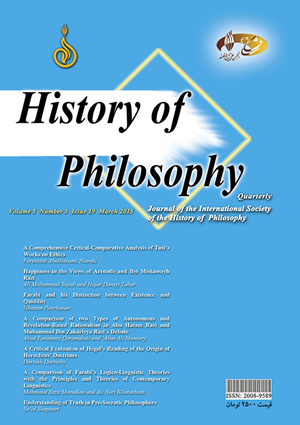A Comparison of Farabi’s Logico-Linguistic Theories with the Principles and Theories of Contemporary Linguistics
Subject Areas : Geneology of philosophical schools and Ideas
1 -
Keywords: Farabi logico-linguistic theories contemporary linguistics ,
Abstract :
The main purpose of the present article is to compare the logico-linguistic theories of Farabi with contemporary linguistic principles and theories. To this end, the writers initially review the history of the development of linguistics and its turning into an independent discipline. Then they introduce the most common fields and theories in contemporary linguistics. Finally, they compare Farabi’s logico-linguistic theories with more recent linguistic concepts and theories. Ten centuries ago, Farabi referred to linguistics as one of the sciences of his time and introduced certain fields, principles, and theories for it which bear amazing similarity to contemporary linguistic theories from several aspects. Moreover, in the science of the laws of singular words, which is the third part of his seven-part science of language, he studies letters, sounds, and words as discussed in the phonology and morphology of today. In the science of compound words (fourth part of his language science), he examines the syntactic structure of sentences and their components. His theories in this regard bear a strange similarity to Chomsky’s phrase structure grammar. By distinguishing grammar or syntax from logic, Farabi established a relationship between them which could be illuminating to the philosophers, logicians, and grammarians following him concerning some of the theories of contemporary linguistics such as the theory of the universal grammar and its principles and parameters, the theory of the language acquisition device and its innateness, and the theory of surface and deep structures. His ideas about syntax and logic and their relationship is extremely innovative and useful, and some clear traces about certain modern theories such as the concept of the phonological surface structure and semantic deep structure of sentences and the theory of the innateness of language can be found therein. This paper explains Farabi’s theories and their relationship with modern linguistic theories in order to reveal some aspects of the genius, breadth of knowledge, academic certitude, and magnanimity of this prominent Iranian and Islamic scientist, philosopher, and linguist following a scientific method.
اوروي، دمينيك، ابنرشد، ترجمه فريدون فاطمي، تهران، نشر مركز، چ2، 1387. #
باقري، مهري، تاريخ زبان فارسي، تهران، انتشارات قطره، چ17، 1391. #
کزازي، ميرجلالالدين، نامه باستان، تهران، انتشارات سمت، ج2، چ1، 1381. #
چامسکي، نوام، زبان¬شناسي دکارتي: فصلي از تاريخ تفکر عقل¬گرا، ترجمه احمد طاهريان، تهران، انتشارات هرمس، 1377. #
فارابي، ابونصر، احصاء العلوم، ترجمه حسين خديو جم، تهران، شرکت انتشارات علمي فرهنگي، 1389. #
فارابي، ابونصر، الحروف، شرح محسن مهدي، بيروت، انتشارات المکتبه الشرفيه، 1369. #
زرين¬کوب، عبدالحسين، آشنايي با نقد ادبي، تهران، نشر سخن، چ2، 1372. #
ژيلسون، اتين، فلسفه اسلامي و يهودي، ترجمه حسن فتحي، مؤسسة انتشارات حکمت، 1385. #
ساغروانيان، سيدجليل، فرهنگ اصطلاحات زبان¬شناسي: موضوعي ـ توصيفي، مشهد، نشر نما، 1369. #
سجودي، فرزان، نشانه¬شناسي کاربردي، تهران، نشر قصه، 1382. #
سوسور، فردينان، دوره زبانشناسي عمومي، ترجمه کورش صفوي، تهران، انتشارات هرمس، 1978.م. #
کوک، و. جي.؛ مارک، نيوسن، دستور جهاني چامسکي، ترجمه ابراهيم چگني، تهران، انتشارات رهنما، 1387. #
نصر، سيدحسين، سه حکيم مسلمان، ترجمه احمد آرام، تهران، انتشارات امير کبير، 1389. #
ياکوبسن، رومن، روندهاي بنيادين در دانش زبان، ترجمه کورش صفوي، تهران، انتشارات هرمس، 1376. #
Brown, H. D., Principles of Language Learning and Teaching, Fourth Edition, Addison Wesley Longman, Inc, 2000. #
Chomsky, N., Cartesian Linguistics: A Chapter in the History of Rationalist Thought. University Press of America: Lanham, 1966. #
Chomsky, N., “Principles and Parameters in Syntactic Theory”, in N. Hornstein & D. Lightfoot (eds.), Explanations in Linguistics, London: Longman, 1981. #
Chomsky, N., Reflections on Language. London, Temple Smith, 1976. #
Chomsky, N., Rules and Representations, Oxford: Basil Blackwell, 1980. #
Chomsky, N., “Transformational Grammar: Past, Present, and Future”, in Studies in English Language and Literature, Kyoto University, 1987. #
Chomsky, N., (1990), “Language and Mind, in D. H. Mellor (ed.), Ways of Communicating, Cambridge: Cambridge University Press. #
Chomsky, N., Review of B.F. Skinner, Verbal Behavior Language, 1959. #
Cook, V. J. & Newson, M. Chomsky's Universal Grammar: An Introduction. Oxford: Blackwell Publishers Ltd, 1997. #
Copleston, F., A History of Philosophy, vol. I, an Image Book: Doubleday, 1985. #
Culler, Jonathan, Saussure, London: Fontana, 1987. #
Sampson, G., Schools in Linguistics, Stanford: Stanford University Press, 1980. #
Leech, G. N., Principles of Pragmatics, Longman: New York, 1983. #
Saussure, F. D., Course in General Linguistics, trans by Roy Harris, London: Duckworth, 1983. #


